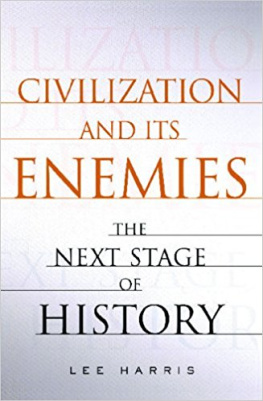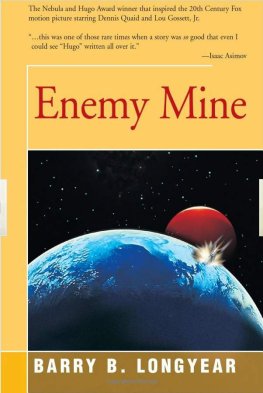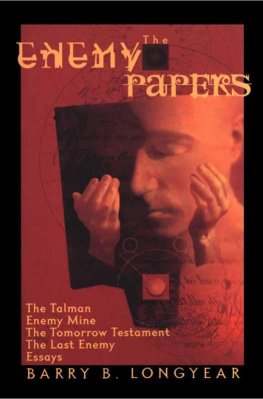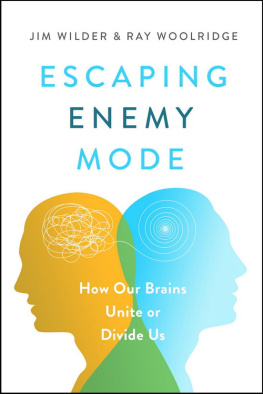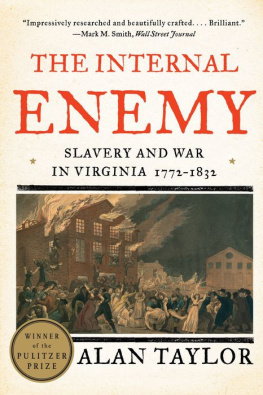Civilization and Its Enemies
The Next Stage of History
Lee Harris
Free Press
New York London Toronto Sydney
FREE PRESS
A Division of Simon & Schuster, Inc.
1230 Avenue of the Americas
New York, NY 10020
Copyright 2004 by Lee Harris
All rights reserved, including the right of reproduction in whole or in part in any form.
FREE PRESS and colophon are trademarks of Simon & Schuster, Inc.
Library of Congress Cataloging-in-Publication Data
Harris, Lee.
Civilization and its enemies: the next stage of history / Lee Harris.
p. cm.
Includes bibliographical references throughout and index.
l. Civilization, Modern 1950 2. World politics 21st century. I. Title.
CDB428.H375 2004
909.08 dc22
2003063136
ISBN 0-7432-6700-1
Visit us on the World Wide Web:
http://www.SimonSays.com
To Andy Fuson
and
Sundown Walker,
for asking me questions I could not answer.
history is strewn with the wrecks of nations which have gained a little progressiveness at the cost of a great deal of hard manliness, and have thus prepared themselves for destruction as soon as the movements of the world gave a chance for it.
WALTER BAGEHOT, Physics and Politics
Contents
Preface
The peoples of the Western world have for some generations now been familiar with systems where armies and navies are rigidly subject to civil authorities, and they are wont to regard the military rebellion as something exceptional and monstrous. Actually the human beings who have lived on this earth in security from the brutal rule of the soldier are so few in number, on the background of the whole of human history, as hardly to count. The military tyranny in some form or other is in fact the common rule in human society; and even in the best-ordered societies any serious disturbance of an established order of a nonmilitary type is likely to result in a reversion to the military dictatorship.
ARTHUR LIVINGSTON, from the Introduction to Gaetano Mosca's The Ruling Class
THE SUBJECT of this book is forgetfulness.
By this I do not mean our tendency to misplace valuable objects, or our inability to recall the name of the boss's dog, but the collective and cultural amnesia that overcomes any group of human beings who have long benefited from the inestimable blessings of civilization an amnesia first observed nearly eight hundred years ago by the Arab philosopher of history Ibn Khaldun, contemplating the rise and fall of those great human feats of organized life that we call by such terms as societies, states, and empires.
Forgetfulness occurs when those who have been long accustomed to civilized order can no longer remember a time in which they had to wonder whether their crops would grow to maturity without being stolen or whether their children would be sold into slavery by a victorious foe. Even then it is necessary for the parents, and even grandparents, to have forgotten as well, so that there is no living link between the tranquility of the present generation and those dismal periods in which the world behaved very much in accordance with the rules governing Thomas Hobbes's state of nature, where human life was "solitary, poore, nasty, brutish, and short." When parents have forgotten what that world was like, they can hardly be expected to teach their children how it was or what one had to do in order to survive in it.
Civilized people forget that in order to produce a civilization there must be what the German sociologist Norbert Elias has called "the civilizing process," and that this process, if it is to be successful, must begin virtually at our birth, and hence many long years before the child can have any say about the kind of training he would have preferred. They forget that the civilizing process we undergo must duplicate that of our neighbors, if we are to understand each other in our day-to-day intercourse. If you are taught to spit at a man who offers to shake your hand, and do when I offer you mine, we will not easily get along.
Civilized people forget how much work it is to not kill one's neighbors, simply because this work was all done by our ancestors so that it could be willed to us as an heirloom. They forget that in time of danger, in the face of the enemy, they must trust and confide in each other, or perish. They forget that to fight an enemy it is necessary to have a leader whom you trust, and how, at such times, this trust is a civic duty and not evidence of one's credulity. They forget, in short, that there has ever been a category of human experience called the enemy.
That, before 9/11, was what had happened to us. The very concept of the enemy had been banished from our moral and political vocabulary. An enemy was just a friend we hadn't done enough for yet. Or perhaps there had been a misunderstanding, or an oversight on our part something that we could correct.
Our first task therefore is to try to grasp what the concept of the enemy really means. The enemy is someone who is willing to die in order to kill you. And while it is true that the enemy always hates us for a reason, it is his reason and not ours. He does not hate us for our faults any more than for our virtues. He sees a different world from ours, and in the world he sees, we are his enemy. This is hard for us to comprehend, but we must if we are to grasp what the concept of the enemy means.
For Himmler, the Jewish children whom he ordered the SS to murder were the enemy because they would grow up to avenge the deaths of their fathers, who had been the enemy before them. We have killed their parents; they will want to kill our children. Hence we have no choice but to kill them first. The fact that they had done nothing themselves, and were incapable of doing anything themselves, was irrelevant.
This is how mankind has always thought of the enemy as the one who, if you do not kill him first, will sooner or later kill you. And those who see the world in this way see it very differently from those who do not.
This is the major fact of our time. We are caught in the midst of a conflict between those for whom the category of the enemy is essential to their way of organizing all human experience and those who have banished even the idea of the enemy from both public discourse and even their innermost thoughts.
But those who abhor thinking of the world through the category of the enemy must still be prepared to think about the category of the enemy. That is, even if you refuse to think of anyone else as an enemy, you must acknowledge that there are people who do in fact think this way.
Yet even this minimal step is a step that many of our leading intellectuals refuse to take, despite the revelation that occurred on 9/11. They want to see 9/11 as a means to an end and not an end in itself. But 9/11 was an end in itself, and that is where we must begin.
Why do they hate us? They hate us because we are their enemy.
* * *
THIS WAS THE REVELATION that came to Theodor Herzl when as a young newspaperman he had been sent to cover the Dreyfus trial in Paris during the 1890s.
Herzl had been born in Budapest, a part of that great polyglot cosmopolitan Austro-Hungarian Empire in which Jews had done so remarkably well. As a student, he had thought that the solution to "the Jewish question" lay in complete assimilation of Jews, or what his biographer Alex Bein called their "disappearance without a trace in the ocean of the surrounding world."
But the reaction of the French crowds to the condemnation of Colonel Dreyfus shattered this illusion. The crowds had shouted: "Death to the Jews!" But why, Herzl asked himself, did they want death to

